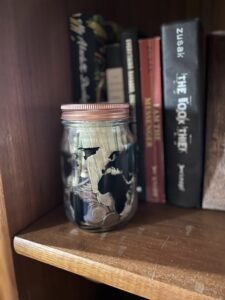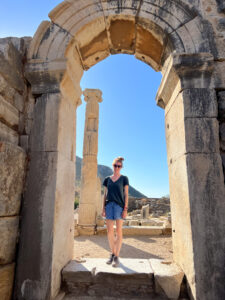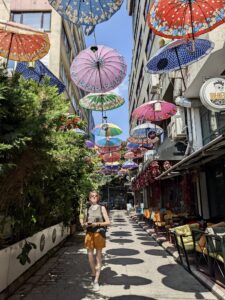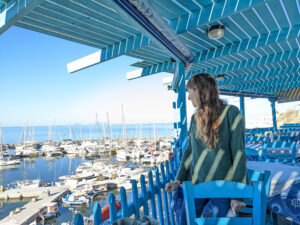
In the United States, we’ve been so conditioned to keep finances private that I have felt conflicted about writing this blog post for a long time. And why? Why are we taught that our financial situations should only be mentioned in discreet whispers, if at all? Unfortunately for us, it turns out that travel requires money, and I have some things to say about it.
I visited Europe for the first time after my junior and senior years of college for summer jobs, and I was desperate to return and travel on my own as soon as I could. But I couldn’t afford to travel the way so many of my friends did after graduating college and grad school. That popular time of wandering and youth hostels that a lot of my peers had in their early 20s wasn’t a reality for me. I think I had a healthy perspective about this—I recognized that I’d been incredibly lucky to have had the two work opportunities I had in Europe, and I didn’t take that for granted for even a second.
But still, it was a stark reminder of how different my circumstances were than those of my Ivy League friends, many of whom were hopping between grad programs and consulting jobs and elaborate group vacations that their families were clearly paying for. They had no student loans to worry about the way I did. I had grown up assuming that travel was only available to people who came from money, and I was determined to prove to myself that it wasn’t true.


For years I kept telling myself that travel would be possible for me one day, because one day surely I’d be able to save some money. But after I graduated, I got a job at a boarding school, and I could barely pay rent. Then I got a job at a prep school in DC, and it still wasn’t enough. Then I got a job at a university, and the pay was even worse. I worked side hustles and summer jobs and spent a billion hours job hunting, always trying to seek whatever the magical financial answer was supposed to be.
And I finally decided that I could either wait forever to have “enough money” and end up never traveling, or I could decide to travel anyway.
I had been planning and trying to save for a trip to Morocco and Portugal that I’d spent years dreaming about when I started my new university job. And though I’d filled out many tax forms in my life, somehow whatever I put on those tax forms resulted in me unexpectedly owing some money at tax time. And when I say some money, I mean an amount that was NOT objectively a lot but that felt insurmountable to me in that moment. I was DEVASTATED.
Though the university where I was working was a prestigious one, the pay was pretty awful. (Those of you who work in the education field get it.) At the time, I was doing a lot of freelance editing and tutoring a random hodge-podge of middle school, high school, and grad students after work and on the weekends just to supplement my income. I’d managed to save a tiny bit for my trip, which I was planning to make that fall. And then suddenly I owed the tax money and had no savings left for my trip.


Though the trip was months away, I had to make decisions about it very early. I had to pay a non-refundable deposit to lock-in a 70% off sale price for the group tour I planned to do in Morocco. I had to purchase a plane ticket. I had to request time off work months in advance. My decision to go or not couldn’t depend on whether I saved the money in time.
And so, dear reader, I decided to take out a bank loan and go.
I can see you—half of you are saying, “Yeah, go girl!” and half of you are shaking your heads with disdain.
I thought it through carefully, had a firm plan in place for paying it off in just a few months, calculated the minimum amount I’d need for my trip, and I took out that small loan. (I think it was for like $1,200.) I’m not saying you should all go right now and take out a loan to go on vacation. The vast majority of the time, I’d consider this a terrible idea. But for me, at that time, it was the absolute right decision. (Can you believe they let me teach a career development class to college students? I stand by what I said—it was the right decision.)
For me, travel wasn’t a frivolous splurge. It was an investment. An investment in myself, in my future, in my writing, in a life that felt meaningful.


Money seems to be a topic for which people feel that what’s “right” and “wrong” is a clear dichotomy. Certain financial decisions are bad and certain ones are good, and there is no gray area in between. I even feel this way myself sometimes. But of course, it’s always more nuanced than that, and what’s right for one person may not be right for another. One thing I’ve learned, time and time again since I started traveling more intently, is that people will openly judge your financial decisions. If your decision differs in any way from one others would make themselves, they will judge you. Friends, I urge you to simply… not care.
Let me also be clear that I’m not encouraging or condoning irresponsibility when it comes to finances. I am not encouraging careless spending or going into long-term debt or making decisions that are not VERY carefully calculated. I’m saying instead to weigh the consequences of your decisions, decide what your priorities are and what something is worth to you, seek advice when you need it, and don’t be bothered by people who you have not invited into that decision process.


While I was still in Portugal at the end of 2019, I already knew what I wanted to do next. Instead of satisfying the urgency I’d felt to travel, that trip only ignited an even greater need. I knew that I wanted to take a longer trip as soon as it was financially possible. And then the pandemic started, and student loan payments were paused, and suddenly, for the first time in my life, I was able to save real money. I diligently saved and planned for two years. I ended my apartment lease in April of 2022, quit my job in May, and left for Europe in early July.
It was a carefully thought-out decision, and it was a time sensitive one. Though covid precautions had lifted, the post-covid crowds and prices hadn’t increased yet, and the Euro and the US dollar were equal for the first time in two decades. Several countries in Eastern Europe were up for consideration to join the Schengen zone, and I knew I would never be able to do the exact trip I was planning again. And it ended up being true—Croatia joined the Schengen zone a month after I returned home, and Bulgaria and Romania have since joined. Today, I would have to reduce my trip length by a month and a half in order to stay in compliance with US passport laws, and prices were significantly lower at the time than they are today. I knew I wouldn’t be able to do the trip so affordably again. There were a dozen reasons why it felt obvious to me that it was the right time.
But people had A LOT to say about it. Some opinions were entirely warranted and came in the form of conversations with people close to me who wanted to better understand. I initiated many of these conversations, eager to talk through financial plans and get input and additional perspective.
But many of these opinions were judgements told, not to me, but to people close to me, as if I wouldn’t end up hearing about it. People could not understand that just because someone else’s priorities look different than theirs doesn’t mean they aren’t important.


Differing priorities made others view my decision as an outrageous splurge outside of my means. If I’d decided to buy a house instead (an EXPONENTIALLY more expensive thing!), people wouldn’t have considered that outlandish, but because my dream was less conventional, many people judged it. To me, it was a careful calculation and leveraging of an opportunity I’d spent a decade dreaming about and would have always regretted not doing.
I certainly don’t have all the answers. The point is, there AREN’T answers—not same-size-fits-all ones. I do know that unless I win the lottery (which is unlikely as I’ve never purchased a lottery ticket), I will probably not be swimming in wealth anytime soon. But I don’t think that means that my life has to be small. I don’t think yours does either, no matter your financial situation.


And though you definitely don’t want me as your financial advisor, I can tell you a few things that have worked for me as a person who doesn’t make a lot of money, doesn’t come from family money, has a 9-5 job, and still prioritizes travel.
- I prioritize keeping excellent credit. I grew up in a family that didn’t have much money to spare, and my parents struggled a lot with money during the early years of their marriage. They did an excellent job of instilling in me that no matter what your salary is or how difficult times are, the most important priority is keeping good credit. And for me, that’s proven to be great advice. I am never late on a bill and hardly ever have a balance on any of my credit cards.
- I churn travel credit cards. I used to be VERY apprehensive about this. (My goal about keeping excellent credit was the source of my concerns.) Credit cards felt synonymous with debt to me despite never having owned one. When I shifted that mentality and started thinking of them no differently than I think of a debit card, it changed my perspective. Now I have a few friends who take advantage of travel credit cards’ incredible advantages, too. We refer cards to each other (for referral bonuses) and help each other reach spending minimums. I don’t just pay off my credit cards every month—I pay any balance off obsessively like twice a week. I even convinced my very skeptical mom to try a travel credit card. She was able to fly to Europe for free AND still have enough reward points leftover for another roundtrip international flight. (If you need advice on the best travel credit cards, ask me!)
- I’m also stingy with my reward points. I know a lot of people who amass credit card points for travel and then spend them all at once on a business class ticket. I would far rather use my points for 3 different flights to Europe in economy seating than to spend them all at once on something extravagant. I’m always thinking ahead to the trip AFTER the trip I’ll take next.
- I always have side hustles. In the past year, I’ve gotten serious about my newborn travel business as a travel advisor and itinerary designer. And while I won’t be quitting my day job anytime soon, it’s work that feels meaningful and brings me joy, and it’s money that I will devote specifically toward travel (which will continue furthering my business.) Traveling also helps my writing, which is something I’m always pursuing.
- And most importantly, I travel on a budget. Again, this is all about what I personally prioritize. Some people might prefer to stay in luxury lodging and eat fine dining for a week, and another person may prefer to spend the same amount of money on shared hostel rooms and street food for 3 months. Those are both valid and fine choices. I aim to fly for free with reward points and stay in comfortable budget accommodations. For me, this means Airbnbs or private hostel rooms if I’m in a more affordable country, and probably a shared hostel room in a boutique hostel if I’m in a more expensive place like Western Europe. I’d also love to try out some volunteering opportunities where you can work in exchange for room and board through a company like Workaway or Worldpackers. Trusted Housesitters is another good option. Here you can stay in a person’s home for free in exchange for taking care of their pets. There are SO many creative ways to travel more affordably.


Travel is an incredible privilege, and it’s not one I take for granted. And while there are many people whose current life circumstances prevent travel from being a possibility in this moment, I do think that travel is possible for many people who assume it isn’t. I think it is worth treating as a priority and investment if this feels urgent to you, and I give you permission to ignore people who try to squash your dreams.


